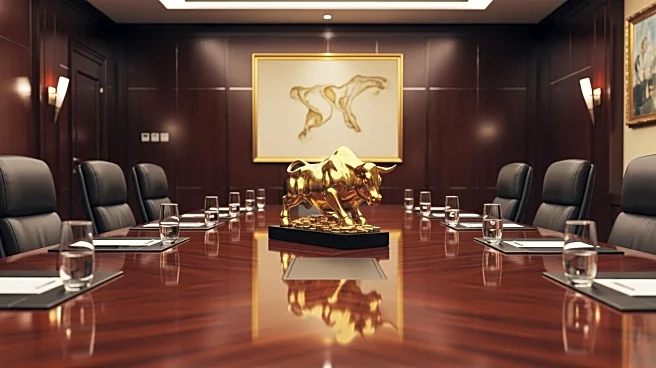What's Happening?
President Trump is set to host a private dinner at the White House with several top business executives, including the chief executives of Nasdaq and JPMorgan Chase. This meeting is part of Trump's ongoing
efforts to strengthen ties with corporate leaders as his administration rolls out initiatives aimed at bolstering U.S. capital markets and rebuilding critical domestic supply chains. The dinner underscores the administration's focus on promoting economic growth while managing tensions with global trading partners. The gathering comes in the wake of JPMorgan Chase's announcement of a decade-long, $1.5 trillion investment program targeting industries vital to U.S. national security and economic resilience, such as supply chain and manufacturing, defense and aerospace, energy independence, and frontier technologies.
Why It's Important?
The dinner with Wall Street CEOs highlights the administration's strategy to leverage private-sector investment to secure the United States' position in high-tech manufacturing and energy supply chains. By engaging with top financial leaders, President Trump aims to foster collaboration that could lead to significant economic growth and stability. The focus on reshoring key industries and expanding domestic production is crucial for enhancing national security and economic resilience. This approach could benefit U.S. companies involved in these sectors, potentially leading to job creation and increased competitiveness in global markets. However, the administration must navigate existing tensions with international trading partners to ensure the success of these initiatives.
What's Next?
The outcomes of the dinner could influence future policy decisions and collaborations between the government and private sector. Stakeholders will be watching for any announcements or agreements that may arise from this meeting. The administration's broader economic agenda, centered on expanding domestic production and leveraging private-sector investment, will likely continue to evolve. Financial leaders and industry stakeholders may respond with increased investment in sectors identified as critical to national security and economic resilience. The administration's ability to manage global trade tensions will be pivotal in achieving its economic goals.
Beyond the Headlines
The focus on national security and economic resilience raises ethical and strategic considerations. The administration's emphasis on reshoring industries could lead to shifts in global supply chains, impacting international relations and trade dynamics. Additionally, the collaboration between government and corporate leaders may prompt discussions on the balance between public policy and private interests. Long-term implications could include changes in regulatory frameworks and investment strategies as the U.S. seeks to maintain its competitive edge in critical industries.










